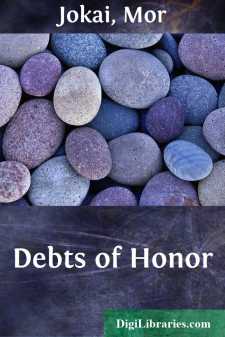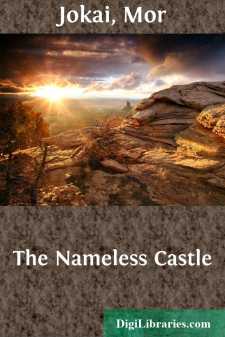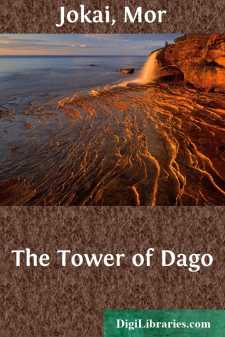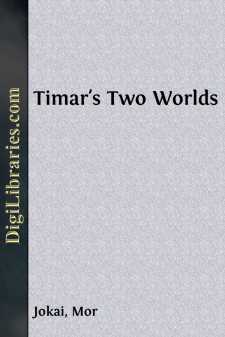Categories
- Antiques & Collectibles 13
- Architecture 36
- Art 48
- Bibles 22
- Biography & Autobiography 813
- Body, Mind & Spirit 142
- Business & Economics 28
- Children's Books 17
- Children's Fiction 14
- Computers 4
- Cooking 94
- Crafts & Hobbies 4
- Drama 346
- Education 46
- Family & Relationships 57
- Fiction 11829
- Games 19
- Gardening 17
- Health & Fitness 34
- History 1377
- House & Home 1
- Humor 147
- Juvenile Fiction 1873
- Juvenile Nonfiction 202
- Language Arts & Disciplines 88
- Law 16
- Literary Collections 686
- Literary Criticism 179
- Mathematics 13
- Medical 41
- Music 40
- Nature 179
- Non-Classifiable 1768
- Performing Arts 7
- Periodicals 1453
- Philosophy 64
- Photography 2
- Poetry 896
- Political Science 203
- Psychology 42
- Reference 154
- Religion 513
- Science 126
- Self-Help 84
- Social Science 81
- Sports & Recreation 34
- Study Aids 3
- Technology & Engineering 59
- Transportation 23
- Travel 463
- True Crime 29
Mor Jokai
Mór Jókai, a prominent Hungarian writer born on February 18, 1825, is celebrated for his contributions to 19th-century literature with over 100 novels, numerous short stories, and plays. Known for his vivid storytelling and historical fiction, his works often explored Hungarian society and history, blending romance, adventure, and political commentary. Among his most famous novels are "The Baron's Sons" and "Black Diamonds," which continue to be cherished in Hungarian literature.
Author's Books:
Sort by:
by:
Mor Jokai
CHAPTER I On a time it happened that the light-house keeper in Aspinwall, not far from Panama, disappeared without a trace. Since he disappeared during a storm, it was supposed that the ill-fated man went to the very edge of the small, rocky island on which the light-house stood, and was swept out by a wave. This supposition seemed the more likely as his boat was not found next day in its rocky niche....
more...
by:
Mor Jokai
CHAPTER I. IN THE MONASTERY. There were six of them besides the Prior and Abbot. The seventh was away in the village, collecting the gifts of charity. "Benedicite," began the Prior. "Here is a message from our most gracious patroness." With that he laid upon the table a sealed letter in Latin, which the others passed from hand to hand. All understood it, but it was evident that not one...
more...
by:
Mor Jokai
CHAPTER I THE JOURNAL OF DESIDERIUS At that time I was but ten years old, my brother Lorand sixteen; our dear mother was still young, and father, I well remember, no more than thirty-six. Our grandmother, on my father's side, was also of our party, and at that time was some sixty years of age; she had lovely thick hair, of the pure whiteness of snow. In my childhood I had often thought how dearly...
more...
by:
Mor Jokai
INTRODUCTION TO THE ENGLISH TRANSLATION OF MY WORKS This is not the first occasion upon which it has been my good fortune to win appreciation and approval for my works from the reading public of the United States. Up to the present, however, it has often been under difficulties; for many of my works which have been published in the English tongue were not translated from the original Hungarian text,...
more...
by:
Mor Jokai
INTRODUCTION The entire Hungarian nationâking and peopleâhave recently been celebrating the jubilee of Hungary's greatest writer, Maurice Jokai, whose pen, during half a century of literary activity, has given no less than 250 volumes to the world. Admired and beloved by his patriotic fellow-countrymen, Jokai has displayed that kind of genius which fascinates the learned and unlearned...
more...
by:
Mor Jokai
CHAPTER IThe Tower As the steamer from Stralsund is approaching the Gulf of Finland, the passenger's attention is attracted by an object which projects high out of the sea. He will hear the seamen call it the Tower of Dago. An old and wealthy Englishman, he may be told, on one occasion felt impelled by curiosity to ask the captain what it would cost him to examine the ruin close at hand. The...
more...
by:
Mor Jokai
CHAPTER I.THE IRON GATE. A mountain-chain, pierced through from base to summit—a gorge four miles in length, walled in by lofty precipices; between their dizzy heights the giant stream of the Old World, the Danube. Did the pressure of this mass of water force a passage for itself, or was the rock riven by subterranean fire? Did Neptune or Vulcan, or both together, execute this supernatural work,...
more...
by:
Mor Jokai
PREFACE. Jokai is one of the most popular of the Hungarian prose writers of fiction that sprang up a few years before the late war. His wit, flowing style, and vivid descriptions of Hungarian life as it is, joined to a rich fancy and great intensity of feeling, soon made him a favourite with Hungarian readers. Among the earlier of his productions, those best known are a novel entitled, "The Common...
more...
by:
Mor Jokai
INTRODUCTION. On September 28th, 1730, a rebellion burst forth in Stambul against Sultan Achmed III., whose cowardly hesitation to take the field against the advancing hosts of the victorious Persians had revolted both the army and the people. The rebellion began in the camp of the Janissaries, and the ringleader was one Halil Patrona, a poor Albanian sailor-man, who after plying for a time the trade...
more...
by:
Mor Jokai
CHAPTER ISNOW ROSES A blizzard is covering the roads with a thick coating of snow. The horses are up to their fetlocks in it. The dark-green firs bend beneath its weight, and what has melted in the midday sun already hangs from the slender branches of the undergrowth in thick masses of icicles; and as the wind sweeps through the forest the ice-covered leaves and branches ring and jingle like fairy...
more...











